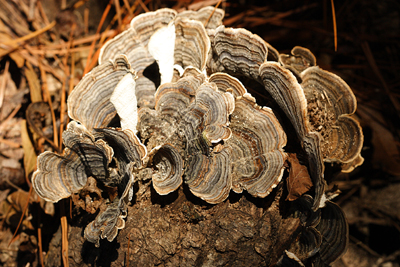Turkey Tail Mushrooms
Fungal Medicine

Beautiful and medicinal, turkey tail mushrooms are a great wild mushroom species to become familiar with. This colorful, banded mushroom is called turkey tail for its resemblance to the semi-circular, banded tails of wild turkeys and goes by the Latin name of Trametes versicolor or Coriolus versicolor or the even older name of Polyporus versicolor.
This mushroom is common in many parts of North America, and grows in shelf-like layers on rotting wood. They are recognized by their thin, boldly banded, fan-shaped and flexible caps, white pore surface underneath and slightly fuzzy cap surface. It is known as a "saprobic" or "saprophytic" fungus, which means it feeds on decaying wood. In this way it plays a vital role in transforming dead wood into material usable by other organisms, and eventually helps in turning that wood into mulch and then soil. They grow on deciduous and occasionally coniferous trees.
Turkey tails are one of the most intensively studied medicinal mushrooms in the world. Recently, this mushroom has earned a lot of attention for its anti-tumor properties.
Medicinal uses
This mushroom has a long history of use in Traditional Chinese medicine. In 2012, the FDA approved the use of it in clinical trials to be used in combination with conventional chemotherapy treatments for several types of cancer.
Turkey tail mushrooms have shown to be effective in some cases as part of the treatment against the following cancers: breast cancer, cervical cancer, gastric cancer, Leukemia, liver cancer, lung cancer and prostate cancer. These mushrooms also have other medicinal properties including antibacterial, antioxidant, antiviral, immune enhancer, kidney tonic, and liver tonic.
How They are Used
Turkey tail mushrooms are used medicinally most often in the form of a tincture or strong tea. Tinctures are extractions made by infusing the cut pieces of these mushrooms in a strong 40-50% alcohol. For more details on making tinctures, check out our article: How to make a tincture.
Turkey tail tea is made by slowly boiling this mushroom, using the hot water to help break down the mushrooms structure. This structure, called chitin, is very tough and difficult for us to digest. Often the boiling process is done for up to 90 minutes or sometimes more. This concentrated tea is then drunk as a immune-boosting tonic.
Some herbalists use both of these methods, and combine them into one tonic. The alcohol extraction and the hot water extraction methods draw out different properties from the mushrooms.
Though the turkey tails themselves are not generally considered a food, they can be added into slow cooked meals such as stews. This allows them to infuse into stew and pass on some of the healthy benefits as part of a meal. Then the mushroom pieces themselves can be removed and composted.
Be More Prepared For Your Next Outdoor Adventure!

Don't leave home without knowing these six essential survival skills. Our free survival mini guide reveals the strategies of:
- Shelter & fire to prevent the number one cause of death
- Obtaining clean water to avoid life-threatening dehydration
- Common wild survival foods and other critical skills!

Cautions for Turkey Tail Mushrooms
Please seek the advice of a doctor before using any kind of plant or fungi medicinally. Turkey tail mushrooms are not typically known to cause complications or counteract other medication, but it is still essential to discuss what is right for you with your doctor. Everybody's body is different, so approach any new kinds of plants or fungi with caution.
By the way, when you're out foraging, it's important to know how to stay safe in the outdoors, especially if you were to get lost. Right now you can get a free copy of our mini survival guide here, where you'll discover six key strategies for outdoor emergencies, plus often-overlooked survival tips.
Resources:
Check out this interesting article about Turkey Tail Mushrooms on the Huffington Post, written by Paul Stamets, the founder of Fungi Perfecti.
Learn more at Alderleaf's Wild Edible & Medicinal Plants Courses.
Disclaimer: This article is for educational purposes only.
It is not intended as a substitute for the advice provided by your
physician or other medical professional. If you have or suspect that
you have a serious health problem, promptly contact your health care
provider. Always consult with a health care practitioner before using
any herbal remedy, especially if pregnant, nursing, or have a medical
condition. Alderleaf Wilderness College, their owners and employees,
shall not be liable for injury, damage, or loss allegedly arising from
the information contained in the articles found on this website.

About the Author: Filip Tkaczyk is a periodic guest teacher at Alderleaf. He also wrote the field guide Tracks & Sign of Reptiles & Amphibians. Learn more about Filip Tkaczyk.
Return from Turkey Tail Mushrooms back to Plants Articles Page
Is The Essential Wilderness Survival Skills Course Right for You? Take the "Online Survival Training Readiness" Quiz
See for yourself if this eye-opening course is a good fit for you. It takes just a few minutes! Get your Survival Training Readiness Score Now!

Grow Your Outdoor Skills! Get monthly updates on new wilderness skills, upcoming courses, and special opportunities. Join the free Alderleaf eNews and as a welcome gift you'll get a copy of our Mini Survival Guide.

 The Six Keys to Survival:
The Six Keys to Survival:
Get a free copy of our survival mini-guide and monthly tips!
Learn more